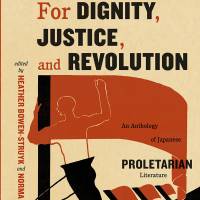In 2008, a previously obscure novella by Takiji Kobayashi entered the best-seller lists in Japan. "The Cannery Boat," a tale of worker exploitation originally published in 1929, acquired new resonance in the fallout from the global economic meltdown. Kobayashi features prominently in "For Dignity, Justice, and Revolution: An Anthology of Japanese Proletarian Literature."
For Dignity, Justice, and Revolution, Edited by Heather Bowen-Struyk and Norma Field.
488 pages
University Of Chicago Press, Anthology.
In spite of the recent gains of Bernie Sanders and his ilk, "proletarian" is unlikely to be part of most readers' vernacular. Even among Anglo-American scholars, proletarian literature in Japan has been largely ignored, which makes this collection of prewar "red" literature both timely and overdue.
Any anthology risks becoming unwieldy, yet this one is lucidly structured around themes such as children, realism and imperialism. Unimposing introductions set out the background and context of each story and section. The editors have also made the welcome decision to retain self-censored and suppressed passages. In addition to short stories, they have included nonfiction criticism and even poetry. The varying lengths of the texts are one of the volume's major merits.
One of the most revealing is a short story by Ineko Sata about the labor movement told from a Christian perspective. Though a small minority in Japan, Christians were conspicuous in socialist and labor circles before the war. Sata's poignant story portrays the anguish of a devout girl caught in the middle of a combative factory strike.


















With your current subscription plan you can comment on stories. However, before writing your first comment, please create a display name in the Profile section of your subscriber account page.